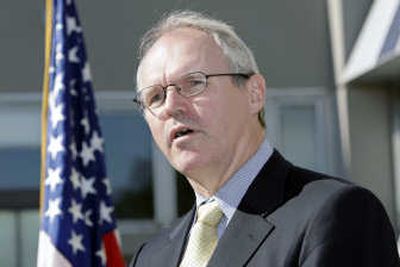North Korea agrees to end nuclear efforts by Dec. 31

WASHINGTON – An announcement Sunday that North Korea has agreed to reveal and disable its nuclear programs by the end of this year represents progress on one of the Bush administration’s few major diplomatic initiatives.
Assistant Secretary of State Christopher Hill, the chief U.S. negotiator, announced on Sunday in Geneva, Switzerland, that North Korea had agreed during two days of talks to reveal all its nuclear programs and disable them by Dec. 31.
“One thing that we agreed on is that the (Democratic Peoples Republic of Korea) will provide a full declaration of all of their nuclear programs and will disable their nuclear programs by the end of this year, 2007,” Hill said.
North Korea had agreed to take those steps under an agreement reached Feb. 13, but Hill’s announcement was the first time a deadline has been declared.
North Korea’s chief negotiator, Kim Gye Gwan, told reporters his delegation “showed clear willingness to declare and dismantle all nuclear facilities,” but made no mention of a deadline.
Hill said earlier Sunday that improving U.S. relations with North Korea will depend on other progress in the talks, saying it “is a relationship that we will continue to try to build step by step with the understanding that we’re not going to have a normalized relationship until we have a denuclearized North Korea.”
He said he expected the next full session of the six-nation talks in mid-September would produce a “more detailed implementation plan for ‘disablement.”’
Experts cautioned that hard bargaining to rid the isolated Stalinist regime of its small nuclear arsenal still lies ahead.
“The reality is that these are going to be far more prolonged and difficult negotiations than probably anybody understands or foresees. But we are going to move fairly soon to a place where people will be able to see the landscape ahead of us,” said Daniel Sneider of Stanford University’s Walter H. Shorenstein Asia-Pacific Research Center.
Some of the major unknowns include whether Pyongyang can be trusted to disclose the full extent of its nuclear programs and whether the communist regime will take steps to ensure that they can never be reactivated, he said.
Even modest progress, however, is a victory for Secretary of State Condoleezza Rice, who championed the decision to resume discussions last year with North Korea as part of the so-called Six-Party Talks, which include Russia, China, South Korea and Japan.
The talks produced the Feb. 13 accord under which impoverished, food-short North Korea is to dismantle its nuclear programs and jettison its weapons in return for economic assistance, security guarantees and diplomatic relations with the United States.
North Korea shut down its main plutonium-producing reactor at Yongbyon in July and received 50,000 tons of fuel oil from South Korea.
Vice President Dick Cheney and his allies, however, have pressed for more confrontational policies toward North Korea, Iran, Syria, Saddam Hussein’s Iraq and other U.S. adversaries.
North Korea, along with Iran and Iraq, comprise the “axis of evil” that Bush condemned in his January 2002 State of the Union speech.
The pronouncement underscored his administration’s goal of ousting regimes it considered major threats to U.S. security.
Bush’s decision later that year to halt fuel oil shipments to North Korea prompted Pyongyang to end an eight-year freeze on plutonium production, expel U.N. inspectors and withdraw from the main international treaty to curb the spread of nuclear weapons. It conducted its first underground test explosion last October.
Joseph Cirincione of the Center for American Progress, a liberal policy institute in Washington, argued that if the administration had started negotiating with North Korea when it took office in 2001, then North Korea probably wouldn’t have expanded its nuclear arsenal from two to an estimated 12 warheads and detonated the underground test last year.
“If the Bush administration had done this when they first came in, we wouldn’t have a North Korean nuclear program to worry about right now,” Cirincione said.
Instead, said Cirincione: “They turned in a completely opposite direction and followed the line of Vice President Cheney. Not only did they not negotiate with the North Koreans, but their policies accelerated their program.”
Cheney and his allies have continued to fight a rear-guard action against negotiating with North Korea.
Just last Friday, former State Department official and Cheney ally John Bolton argued in the Wall Street Journal that “little real progress has been made in eliminating Pyongyang’s (nuclear) program” and charged that advocates of the negotiations need “a diplomatic success to justify long years of faith in the Six-Party Talks.”